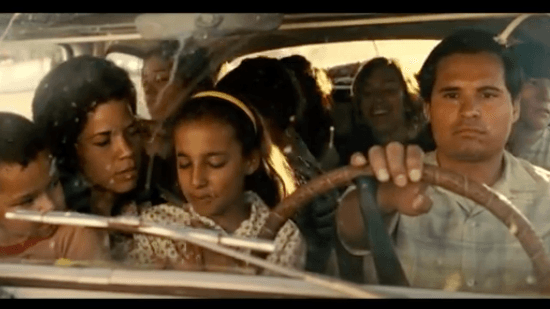The new film ‘Cesar Chavez’ retells the start of his movement in Delano, California
The new film “Cesar Chavez” stars Mexican-American actor Michael Peña as the labor rights leader. It shows scenes of farmworkers harvesting crops on bloodied knees and paying to drink lukewarm water from a shared tin cup.
Those scenes strike a powerful chord with the farmworkers who were present during the historic strike.
“All we wanted was our basic rights,” says Roberto Bustos, who says the film shows what he endured in the town of Delano, in California’s Central Valley — and what convinced him and others to go on strike in 1965.
He was 23 then. “[We wanted] the right to organize … basic rights — that’s what we were fighting for. People talk about ‘what happened?’ Well, that’s what happened. And we brought a lot of changes — you know, restrooms in the fields, clean, fresh, cold water and to be treated like human beings.”
Bustos points to what is now a Pentecostal church across from an alfalfa field. There’s no sign marking the site, but it was the first union headquarters, and where Chavez began his historic farmworker march in 1966.
“We thought he was talking about a caravan. He said, ‘No, no, no, we’re talking about walking. We’re going to be marching to Sacramento,’” says Bustos. “We thought, ‘That guy is crazy.’ We thought maybe all the pesticides in the grapes have affected his brain. Now he wants us to walk!”
And walk they did, with Bustos as captain of that march.
“Man, blisters galore! We were marching in shoes, our Sunday shoes. We didn’t know anything about marching,” he says.
Director Diego Luna wove old news footage into the movie. He made the film in Mexico and recreated sites, like the town’s Filipino Hall. It was where Filipino and Mexican strikers came together.
Lorraine Agtang was born in a Filipino labor camp in Delano. She was a teenager when Chavez led the massive strike against California grape growers. She says she’s glad the film shows Chavez leading Filipino as well as Mexican farmworkers.
“Cesar opened the door to the world for all of us,” Agtang says. “We were just little farmworkers. I don’t think I’d ever been outside of Delano. And then to see the impact, that actually the whole world supported the union and everyone was not buying grapes. [It was] pretty amazing.”
The film also points to Chavez’s 25-day fast in 1968 that brought international attention to the farmworkers’ plight. Chavez’s son, Paul, stands near the adobe brick gas station where his father stayed during his fast. “I do not remember this room being so small and so barren. Pretty stark,” he says. The room has just a single bed and a side table with a water pitcher on it.
Paul was 11 when his father stopped eating. “It’s a scary feeling to see somebody you love become weaker by the day, knowing they could just start eating [and] that it would be ok, and not understanding why he wouldn’t eat. But as I got older, I understand the importance of sacrifice and penance.”
So far, some critics have dubbed Diego Luna’s film as one-dimensional and portraying Cesar Chavez as saintly. But Paul Chavez, who says he weighed in heavily on the film’s script, disagrees.
“We want to make sure that we don’t put my father up on a pedestal,” he says, “so that we [don’t] make him larger than life and people think there’s only once in a lifetime that a Cesar Chavez comes. … he was a regular person. He never owned a car, never owned a house. He showed that regular, ordinary people can do extraordinary things.”
But if you ever make it to Delano, you won’t find a museum or even a mural dedicated to Chavez. There is a national monument at Chavez’s later headquarters, about an hour away. But in Delano, the town’s only museum just has replicas of old buildings and farm tools.
This is the first in a two-part series on the legacy of Cesar Chavez in Delano, California. Part two of this series can be found here.
We’re looking for your stories of encounters with Cesar Chavez, who is celebrated each year on March 31. Have images or tales to tell? Share them in the Global Nation Exchange on Facebook.
Our coverage reaches millions each week, but only a small fraction of listeners contribute to sustain our program. We still need 224 more people to donate $100 or $10/monthly to unlock our $67,000 match. Will you help us get there today?
